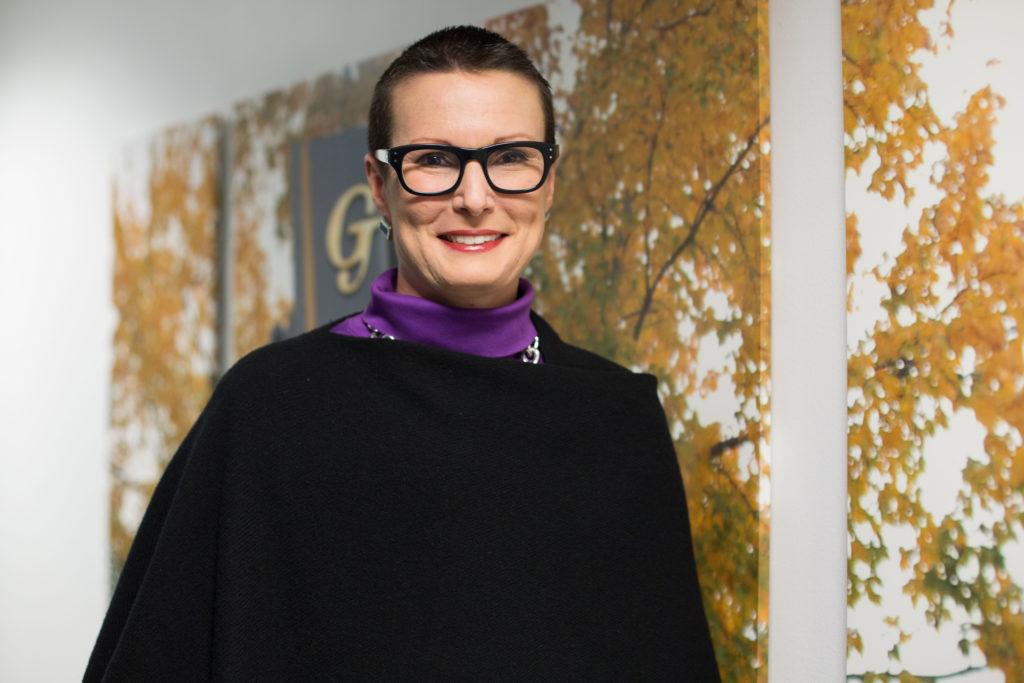Updated: Feb. 7, 2018 at 2:38 p.m.
A professor in the nursing school received a national award for writing the first-ever scholarly book on providing inclusive end-of-life care to LGBTQ patients.
The book, “LGBTQ-Inclusive Hospice and Palliative Care: A Practical Guide to Transforming Professional Practice,” was written by nursing professor Kimberly Acquaviva and was named best in its category in the 2017 American Journal of Nursing book of the year awards. Acquaviva said she hopes the book will encourage healthcare professionals to create a more inclusive and accepting environment for LGBTQ patients.
AJN book of the year is an annual award that recognizes the best health care literature in 20 different categories. Acquaviva’s book was awarded first place in the palliative care and hospice category.
The winners of each category are selected by a group of expert judges.
The book, which was published last May, speaks to health care professionals who work with aging adults about how they can be more inclusive when providing care to LGBTQ patients through their language and interactions. Acquaviva said the book draws from her personal research and interviews with doctors and nurses.
She said the inspiration for the book came from her experiences doing clinical work in hospice and palliative care and her interest in caring for LGTBQ patients.
Since older LGBTQ individuals grew up in a less accepting political and social climate, Acquaviva said they often feel nervous opening up to their health care professionals about their sexual orientation – something these professionals should be aware of and open to discussing.
“Aging isn’t one of those things that people talk about except in the context of not wanting to age,” Acquaviva said. “LGBTQ folks face that same ageism that the rest of the country has and the same anxiety around talking about aging.”
In a 2016 survey conducted by the LGBT Aging Center, 78 percent of older LGBTQ adults said that LGBTQ patients could not be open about their identities with their doctors and nurses because their community was often discriminated against in the past.
Acquaviva, herself a member of the LGBTQ community, said she hopes the book mitigates anxiety that these patients might experience by encouraging health care professionals to provide inclusive care, where a patient does not face hostility or discrimination on the basis of their sexual orientation.
Acquaviva wrote the book while on a six-month sabbatical in 2016. She said she looked to past literature on care for elderly members of the LGBTQ community and included personal testimonies from patients and health care professionals.
Acquaviva added that one noteworthy personal account in the book was from Jennifer Hawkins, a registered nurse, who described how she grew more aware of balancing her personal values as a conservative Christian with providing inclusive care for her patients.
“One of the things that I wanted to be really conscious about in writing the book is writing to everybody, and not just to folks who politically are comfortable with issues around LGBTQ people,” she said.
Andrew Lawton, a doctor at the Dana-Farber Cancer Institute – a research and treatment center in Boston – said in a review of the book in the Journal of Palliative Medicine that Acquaviva “offers a practical framework to help clinicians deepen their self-awareness and mitigate the attitudes or judgements that might negatively impact the inclusive care they aim to provide.”
While Acquaviva is not a nurse herself, she is a researcher and founding faculty member in the School of Nursing who has been working in the program since 2004. She was promoted to a full-time professor position last summer.
Acquaviva, who lives with her wife, son and their three dogs, said she has always had an interest in both hospice and palliative care – care for patients suffering from a life-threatening or terminal illness – along with LGBTQ advocacy work. She said GW has supported her work by allowing her to go on sabbatical to write her book.
“It really makes it a comfortable place for me to be a lesbian who’s a scholar,” she said. “It’s been just incredible to know that I have the support of the school and the dean in doing work like that, contributing to the field.”
Acquaviva said there has been an emerging conversation about LGBTQ hospice and palliative care patients in recent years, and she wants the conversation to continue.
The Human Rights Campaign promoted Acquaviva’s book on Twitter in honor of Hospice Month in November.
“If I’ve written a book that’s able to be helpful to the field of nursing, then I really have accomplished my goal as a faculty member in a school of nursing,” Acquaviva said.
This post was updated to reflect the following clarification:
The Hatchet reported that Acquaviva’s book was named book of the year by the American Journal of Nursing. The AJN’s book of the year awards name recipients in 20 categories. Acquaviva won first place in the palliative care and hospice category.





